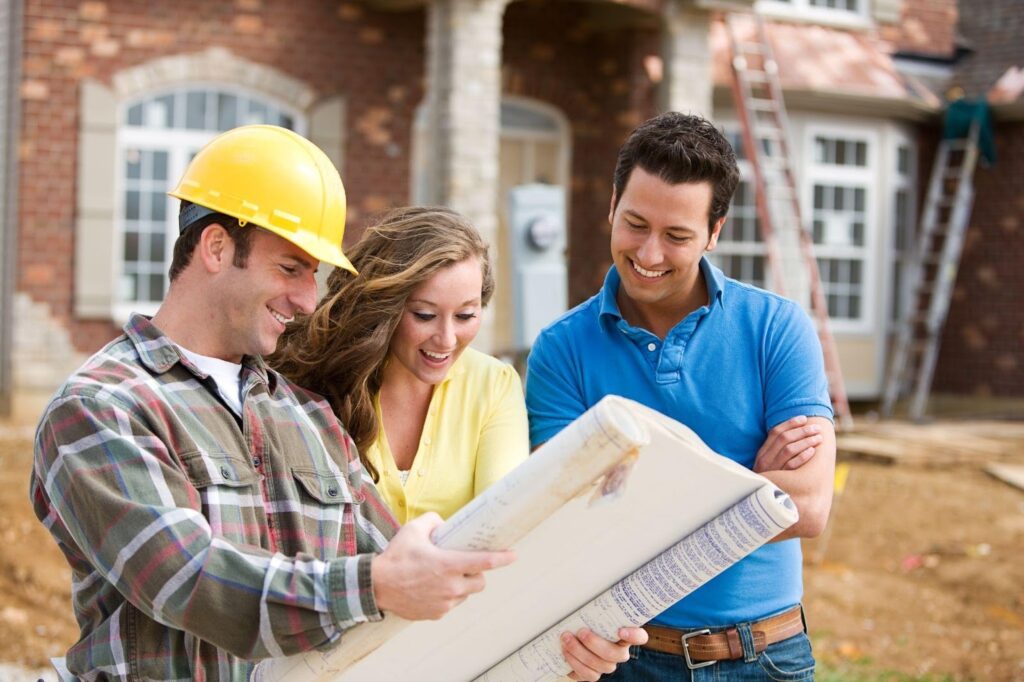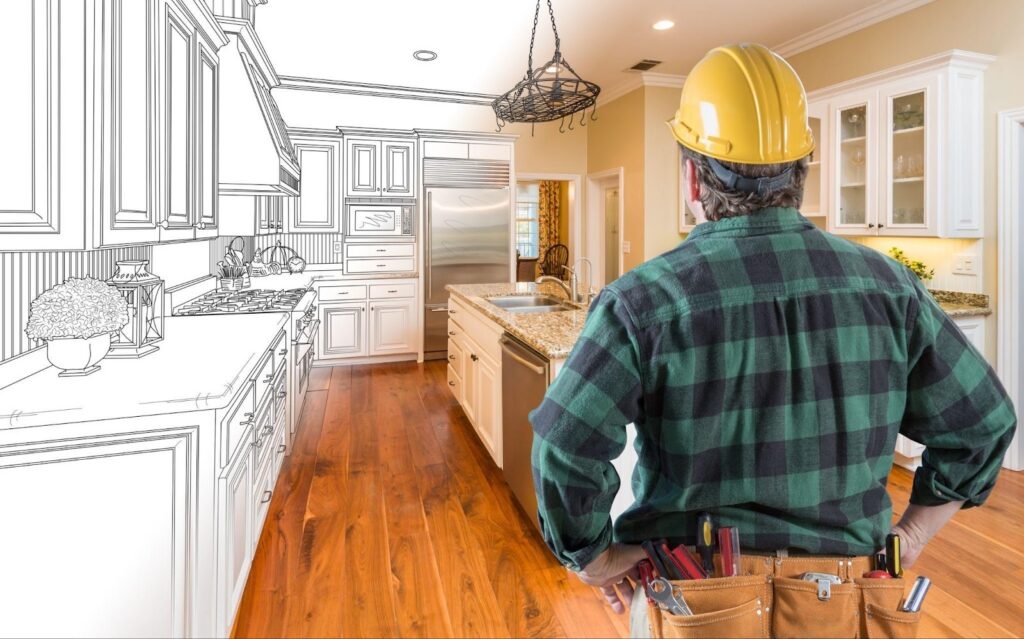Choosing the right home builder is a pivotal decision when creating your dream home. The right builder influences the construction process as well as your overall satisfaction with the final outcome. A skilled and reliable home builder ensures every aspect of your home, from foundational integrity to the finishing touches, meets your expectations, transforming your vision into your dream home.
A good builder impacts the entire home-building experience — ensuring timely completion, staying within budget, and minimizing stress through clear and transparent communication. They navigate you through any challenges, making the transition from design to completion smooth.
A committed builder uses quality materials and maintains professionalism in managing paperwork and legal requirements, protecting you from potential issues. Ultimately, the perfect home builder doesn’t simply construct a house; they enhance your path to homeownership, making it a fulfilling and memorable adventure.
We’ve collected 10 tips to make the process of choosing the right home builder easier than ever.
1. Define your needs
Defining your specific needs is the foundational step in selecting the right home builder. Before diving into the sea of potential builders, it’s crucial to have a clear understanding of what you’re looking for in a home. This clarity will not only streamline the selection process but also ensure that the builder you choose can truly deliver your vision.
Start by considering the type of home you envision. Are you interested in a sprawling single-family home, a cozy bungalow, or a modern townhouse? Each builder specializes in different types of construction, so knowing the style and architecture you prefer helps narrow down the choices.
Budget is another critical factor. Determine how much you are willing to spend and remember to factor in additional costs that might arise during the building process. A clear budget will help you avoid builders whose offerings are outside your financial comfort zone and will also prevent potential financial strain as the project progresses.
Timeline is equally important. If you have a strict deadline for when you need to move in, you’ll require a builder who can commit to that schedule. Delays in construction can lead to unnecessary expenses or inconvenience, so a builder’s ability to meet deadlines is paramount.
Having a well-defined list of needs and priorities not only facilitates a smoother selection process but also ensures that you engage with builders who are well-equipped to create a home that matches your lifestyle and expectations. This initial step of defining your needs is about aligning your dreams with reality, setting the stage for a fruitful collaboration with the right builder.
2. Research potential builders
Embarking on the quest to find the perfect home builder requires thorough research and a strategic approach. Here are some ways to effectively gather a list of potential builders who may be suited to bring your dream home to life.
Starting your search
Begin by tapping into local resources. Your local home builders’ association is a treasure trove of information, providing a list of registered builders who adhere to local building codes and standards. These associations often have detailed profiles of builders, showcasing their specialties and past projects.
Online reviews and testimonials are another invaluable resource. Websites like Houzz, HomeAdvisor, and even Google Business provide insights into other homeowners’ experiences with specific builders. Pay close attention to comments about the quality of construction, adherence to timelines, communication style, and how effectively the builder handled any issues that arose.
Personal recommendations will also guide your search. Speak to friends, family, or colleagues who have recently undertaken a construction project. First-hand accounts of their experiences will provide honest and direct insights into the reliability and quality of a builder’s work.
As you gather names, create a detailed list of potential builders. For each candidate, note down key information:
- Background and experience in the industry.
- Types of homes they specialize in.
- Reviews and ratings from various sources.
- Any personal anecdotes or recommendations you’ve received.
Organize this information so that you can easily compare each builder. A spreadsheet is particularly useful here, enabling you to sort builders by criteria such as experience, expertise, or review score.
Remember, the goal of this research phase is not to find any builder but to find the right builder for your specific needs. By systematically researching and documenting potential builders, you equip yourself with the necessary information to make an informed decision, ensuring that the builder you eventually choose is well-aligned with your vision, budget, and timeline.
3. Check the builder’s credentials and experience
Ensuring that your potential home builder has the appropriate credentials and a positive, proven track record is critical. This verification process safeguards your investment but also provides peace of mind that your home will be built to standard and on schedule.
Verifying credentials
Start by checking that the builder holds all necessary licenses for residential construction in your area. These licenses demonstrate that the builder adheres to local regulations and industry standards, which is essential for both safety and compliance. You can typically find licensing regulations through your state’s construction licensing board or local building department.
Insurance is another critical factor. Ensure that the builder carries both liability insurance and workers’ compensation. This protects you from being held financially responsible if accidents or damages occur on the job site. Requesting proof of insurance is standard practice; any reputable builder will be ready and willing to provide this documentation.
Professional certifications, such as those from the National Association of Home Builders (NAHB) or local building associations, also add an extra layer of credibility. They indicate that a builder is committed to maintaining high standards of craftsmanship and business practices.
Assessing experience and relevance
To gauge a builder’s experience, review their portfolio of completed projects. This gives you insight into the variety and quality of their work. Look for projects similar in style and scale to what you envision for your home. This specificity ensures that the builder has the capability and expertise to execute your particular vision.
Consider also the builder’s experience in your planned location. Builders familiar with your area are more likely to have established relationships with local suppliers and subcontractors, which usually leads to smoother logistics and potentially lower costs.
They’ll also have a better understanding of the local climate and environmental factors, which will impact building materials and techniques.
4. Review past work and references
Reviewing a builder’s past work and speaking with references are invaluable steps in choosing the right home builder. These actions give you firsthand insights into the quality and style of the builder’s work and provide a glimpse into the experience you might expect during your own home-building process.
Touring past projects and model homes
Visiting completed projects or model homes allows you to assess the builder’s craftsmanship, attention to detail, and overall quality of construction.
As you walk through these homes or browse a gallery, pay attention to the finishes, the materials used, and the construction techniques. Notice how well the spaces are designed and how the aesthetic elements align with what you envision for your own home. These visits also give you a sense of how well the builder’s style matches your personal taste and if their standards meet your expectations.
Approaching references
Speaking with past clients offers another layer of insight that informs your decision. When you contact references, prepare specific questions that will elicit useful information. Consider asking about the following:
- Project management: Did the project stay on schedule and budget? If not, how did the builder handle adjustments or setbacks?
- Satisfaction: Are the homeowners happy with the final outcome? Would they hire this builder again?
- Post-completion service: How does the builder handle warranty issues or any problems that arise after completion?
The responses to these questions reveal a lot about the builder’s professionalism, reliability, and customer service. They also highlight the builder’s strengths and potential areas for improvement, helping you gauge whether they’re the right fit for your project.
By thoroughly reviewing a builder’s past projects and speaking directly with previous clients, you equip yourself with crucial information to ensure your chosen builder delivers the quality and style you desire and a smooth and satisfactory building experience.
5. Understand their communication style
An effectively communicating builder will regularly update you on your home’s progress, promptly alert you to any challenges, and discuss solutions. This openness builds trust and ensures you’re never in the dark about your project’s status. It also improves decision-making by allowing you to provide crucial feedback during various construction stages.
To ensure a builder’s communication style meets your needs, consider the following:
Initial interactions: Notice how the builder communicates during your initial conversations. Are their responses prompt and clear? Do they thoroughly answer your questions?
Method of communication: Clarify and agree on preferred communication methods, be it emails, phone calls, or in-person meetings. The builder should be flexible and responsive across all chosen platforms.
Regular updates: Find out how the builder provides updates. Do they hold regular meetings, or update you at specific project phases? The frequency and detail of these updates will indicate how well-informed you’ll stay throughout the build.
Problem resolution: Ask about times when issues arose and how the builder communicated during those instances. Were they proactive and transparent in their problem-solving approach?
Feedback mechanism: Ensure there is a structured process for you to provide feedback and that the builder is open to it. A builder who values and incorporates client feedback typically excels in communication.

6. Compare pricing and inclusions
Navigating the nuances of pricing and inclusions in builders’ quotes is key to choosing the right home builder. Begin by requesting itemized quotes from potential builders. These should clearly break down the costs of materials, labor, permits, and other fees, allowing you to directly compare offerings and see where costs vary.
Pay close attention to what is included in the standard price versus what is considered an additional cost. For instance, one builder may include high-end finishes in the base price, while another may list them as expensive upgrades.
It’s crucial to understand the fine print in any builder’s contract, as it may influence the project’s cost and outcome. Key elements to examine include:
- Inclusions: Identify what the base price covers. Check if allowances for fixtures or fittings align with your expectations.
- Exclusions: Know what is not included in the quote, such as certain groundwork, landscaping, or interior finishes that you might assume are standard.
- Warranties: Review the warranty terms. What do they cover and for how long? This reflects the builder’s confidence in their work and their commitment to resolving post-construction issues.
- Penalties and incentives: Look for clauses related to delays or overruns. Are there penalties for not meeting deadlines? Are incentives offered for early completion?
7. Evaluate vendor and supplier relationships
A builder with robust relationships with vendors and suppliers is key to securing materials at competitive prices and with favorable terms. Strong connections are especially crucial in navigating supply chain challenges or shortages, allowing builders to keep projects on schedule without typical delays.
Vendors with long-term partnerships with builders tend to deliver higher standards and meet deadlines more reliably. Their ongoing relationship with the builder hinges on their ability to consistently provide quality materials. These relationships also provide builders with the leverage to request custom or rare materials, offering you greater flexibility in personalizing your home.
To evaluate the strength of a builder’s vendor relationships, ask about their supply chain management and procurement strategies during initial discussions. Questions about how they manage material shortages or price changes reveal much about their operational efficiency and reliability.
8. Assess flexibility and customization options
Check how open a builder is to customizing plans. Many offer flexible designs you can extensively tailor, allowing changes to floor plans, finishes, or specific features from scratch. This ability to customize transforms a standard home into your dream home.
During initial talks, share your specific desires and unique design elements, and observe if the builder is enthusiastic and proactive about incorporating your ideas.
The construction process often requires flexibility as changes may arise from unforeseen structural issues, material availability, or changes in preferences. A builder’s ability to manage these changes without causing delays or complications is crucial.
Experienced builders with robust project management processes can effectively recalibrate resources and schedules to accommodate new requirements, maintain project momentum, and control costs.
9. Look at after-sales services
Quality after-sales service shows a builder’s commitment to their work and your continued satisfaction. This might include follow-up visits to check everything works correctly and efficient handling of any repairs under warranty.
Reliable builders provide detailed documentation of your home’s features, a clear explanation of the warranty, and a designated contact for any issues after you move in. A comprehensive warranty should cover everything from the home’s structural integrity to the functionality of its mechanical systems, protecting you from unexpected repair costs due to defects or wear and tear.
10. Make a decision
While factual data is crucial, don’t underestimate the importance of your intuition. You need to feel comfortable and confident with the builder, as they will bring your dream home to life. If you feel a strong rapport and trust in their integrity, these factors are as crucial as the analytical data.
If you’re hesitating despite positive indicators, consider revisiting their past projects or asking more questions. Alternatively, if a builder doesn’t quite meet all criteria on paper but feels like the right choice, explore why your gut feels strongly — perhaps it’s their innovative approach or their effort to understand your vision.
By considering all facts and listening to your instincts, you will select a builder who meets both your practical requirements and personal expectations, paving the way for a successful and fulfilling home-building experience.

Patterson Homes is the right builder for you
Finding a builder who aligns with your vision, values your input, and operates transparently and professionally is essential for a successful and enjoyable home-building experience. Ready to choose the perfect home builder?
Patterson Homes consistently demonstrates a commitment to excellence, blending meticulous craftsmanship with responsive customer service and a deep understanding of the importance of creating a personalized living space. With years of experience and a portfolio of stunningly executed homes, they have established themselves as a trusted leader in the industry.
Choosing Patterson Homes means partnering with a builder who will deliver a high-quality home that fits your lifestyle and preferences but also provides a smooth and supportive building process from start to finish. Our attention to detail, robust after-sales support, and ability to incorporate innovative features tailored to your needs make them a standout choice.
Patterson Homes is ready to become your partner in building your dream home. With our expertise and dedication, your vision will be transformed into a beautiful reality that you and your family will cherish for years to come.
For a smooth, supportive home-building experience from start to finish, contact Patterson Homes today.

